Nature-based innovation is the key to saving Suriname’s forests
Discussion details
In the sweltering humidity of Suriname’s coastal mangrove belt, the regular pounding of Atlantic waves competes with another continuous sound - the buzzing of thousands of bees. As the rising ocean relentlessly threatens to wash away the precarious mangrove forests, so the bees pollinate new mangrove trees which are vital to holding the sea at bay.
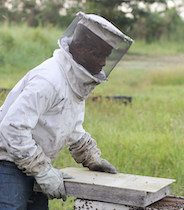
“It’s a perfect example of nature working in harmony,” says local beekeeper Fabian Esajas, who was born and bred in the coastal region of Coronie. “The bees pollinate the mangroves, which naturally regenerate. In turn the mangroves provide the nectar the bees need to make honey. It’s a win for nature and a win for people.”
To describe Fabian as a beekeeper scarcely does him justice. A self-made entrepreneur and poster-child for sustainable business, he is as passionate about bees as he is about protecting Suriname’s forests. A US$200,000 loan from the World Bank means he will soon have up to 700 hives dotted along the coastline.
As one of Suriname’s best-known entrepreneurs and innovators, Fabian is well placed to celebrate the International Day of Forests, dedicated this year to ‘forests and innovation’. As well as introducing the game-changing ‘Perone’ beehive to Suriname, he was instrumental in drafting Suriname’s National Standard for Honey, is a pioneer in mangrove restoration and is the driving force behind Ambrosius Bees, one of the country’s leading honey producers.
“Since I was a little boy, I always wanted to work with nature,” he says. “I was born with it. Beekeeping gave me that opportunity - I love bees, I live with bees, I have bees in my garage and in my yard - just like some people keep a dog, I keep bees! I also communicate with them - people tell me I am crazy but I don’t care.”
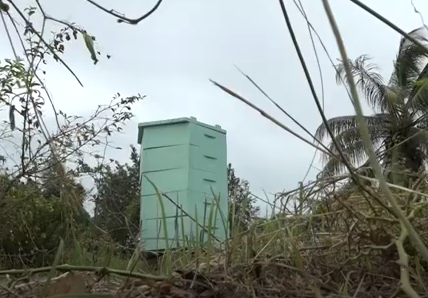
Whilst bees are not the only answer, there is a growing acceptance that we need to work with nature, not against it. For Fabian, that includes investing in new techniques such as the revolutionary and cheaper Perone hive. Unlike traditional hives, the hexagonal structure mimics the holes in large trees where bees like to nest and allows them to produce honey as they would in the wild. They can also double the volume and value of honey produced each year.
Fabian is just one of Suriname’s approximately 70 licensed beekeepers - a vital part of the country’s sustainable agro-forestry sector. Under to the EU’s GCCA and GCCA+ programmes, which ran from 2008-2022, climate adaptation work in Suriname focused on strengthening climate resilience, flood protection and sustainable livelihoods in the low-lying coastal mangrove forests using nature-based solutions. As well as bee-keeping and honey production, local farmers - including women - received training and support to grow climate-resilient fruit and vegetable crops.
Now, thanks to €10 million funding from the EU, this nature-based approach will be extended through an innovative Sustainable Forest Livelihoods project to benefit the indigenous rural communities living in the country’s rainforests away from the coastal zone. The project, implemented by Agence française de Développement (AFD) and executed by WWF-Guianas, covers the two neighbouring countries Suriname and Guyana (with each an equal amount).
“What’s really exciting is that the approach is led by the communities themselves,” says Jerry A-Kum, Programme Coordinator for Sustainable Forest Livelihoods at WWF-Guianas. “We had a meeting with indigenous village leaders from four villages in Suriname, and after the meeting, one of the leaders came up to me and said, ‘You know Jerry, this is the first time we have been given an opportunity to present our own ideas. This is the first time that we have been listened to.’ That’s the difference.”
“It’s very straightforward,” adds Jerry. “Whatever we achieve, the approach has to come from the communities. The communities will present their own ideas, they will say what is suitable for them, how it should be working or not."
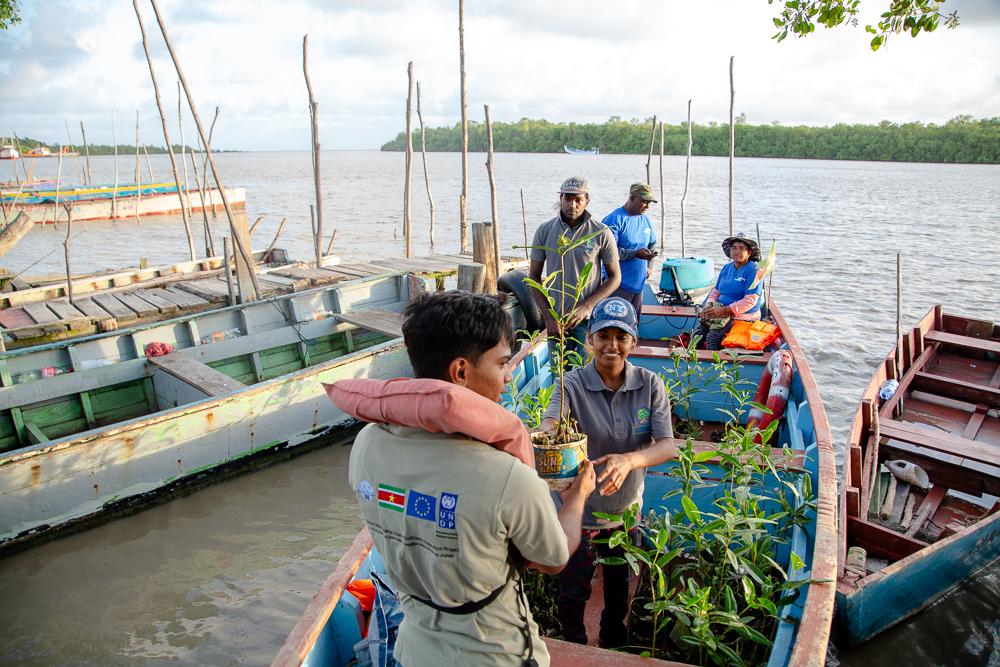
The Sustainable Forest Livelihoods project builds on previous EU partnerships with local communities and national governments in the region. Past EU-funded projects in Suriname included training women to get involved in coastal protection; installing irrigation systems for climate-smart agriculture; and training young indigenous forest rangers to work in an Amazon Conservation Team.
For Suriname, new regulations such as the 2023 Regulation on Deforestation-free products (EUDR) - which replaced the previous EU timber regulations - could be challenging. The country now has to comply with stricter laws and traceability systems if they are to export forest and agricultural products to the EU. “There are some communities in Suriname who manage their own forests and sell the wood,” explains Jochem Schneemann, an experienced consultant who works for the EU’s Forests for the Future Facility (F4F). “The problem is getting the timber and timber products to the market - they have to get from the interior to the coast and that’s a challenge - I have been on the Suriname river and let’s say it can be quite an adventure!”
Currently Suriname is experiencing an economic downturn. Jerry worries that could fuel more deforestation. “If people are going through a rough time, through an economic recession, they can be quite susceptible to illegal activities such as illegal logging or mining. We have to offer alternatives so they can make ends meet, benefit from the forest whilst at the same time making sure it is looked after and kept healthy.”
“Suriname is very rich in forests, and the cover is relatively good,” adds Jochem. “But there has been a lot of degradation, especially caused by illegal mining. The mercury from gold mining has heavily polluted waterways, including the Suriname river in some places, and that’s a problem for safe drinking water and the damage being done to the river’s biodiversity. Small-scale mining is a real problem - it’s very tempting for young people who want to get rich quick.”
Jochem is convinced that Suriname can move towards a more sustainable approach to forestry and the use of natural resources. “It’s good that more attention is being focused on forests, but what is really needed is help for people to scale up. They need good materials, good standards, stable regulations, good technology, training and support. They need access to credit and loans so they can invest, buy better equipment and scale up. There are so many possibilities, but we need to put the right conditions in place so that entrepreneurial people can really grasp the opportunities.”
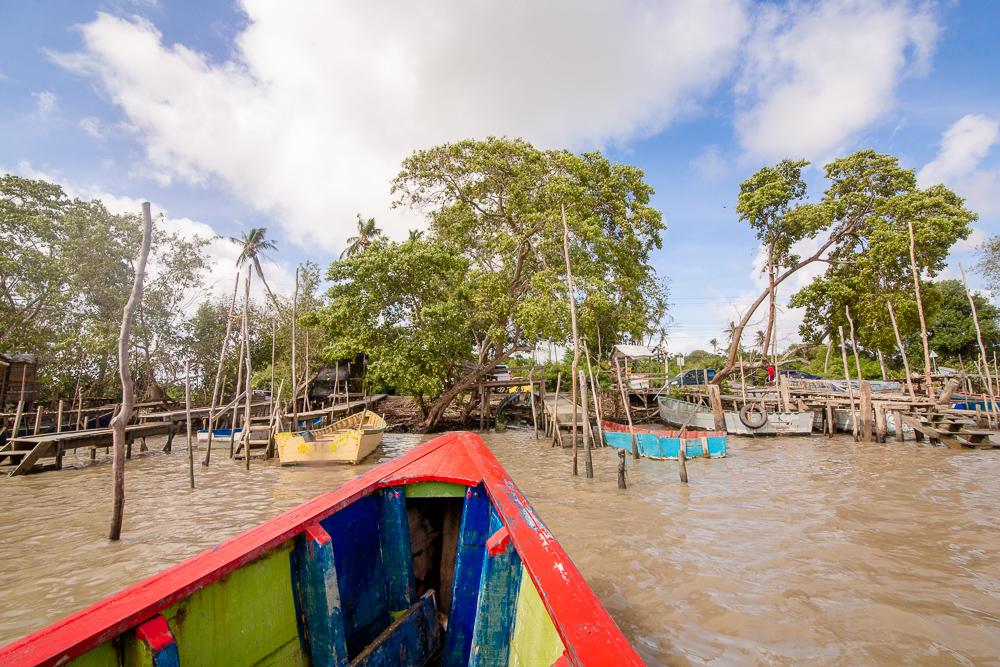
Jochem points to Fabian’s beekeeping business as an example of what can be achieved, given the right support. “It’s a perfect example of so called ‘nature-based solutions’ (NBS) which are based on man working with nature instead of against it. The EU is also in favour of NBS as one way to enhance a sustainable economy.”
“The people on the ground are crying out for change,” agrees Jerry. “The momentum for change is there - people are asking us, how do we set up a company? How do we become successful entrepreneurs? How do we secure a loan? The communities are not only asking for advice on sustainable activities, but how to manage them.”
Jerry, himself a former tour guide and director of Tourism of Suriname, points to the huge potential of sustainable nature tourism as a good example of how forests can benefit remote villages. “Community economies should be based on forestry activities, not on deforestation,” he says. “We’re talking about tourism provided by the community, for the community. It shouldn’t be just one person who benefits, but the entire village. When we explain the difference between community-based nature tourism and regular tourism, they are delighted because they benefit directly and can use the revenues to finance other development activities.”
Sustainable businesses also mean there is more change that young people will see opportunities in their own backyards, rather than having to leave their communities or even emigrate abroad. “Youngsters are leaving the area where they grew up to look for work,” says Jerry. “Sustainable livelihoods and sustainable economic enterprises give them a reason to go back to their communities.”
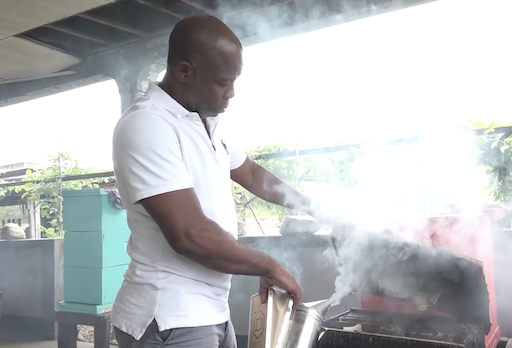
Back among his bee hives, Fabian is also convinced that creating economic opportunities for youngsters is the key to a more sustainable future. Putting his money where his mouth is, he’s trained more than a hundred local young people and donated bee hives to them so they can start their own businesses.
Fabian also points to the potential to create successful business models. “One of my students now has a sustainable business making furniture for yachts from recycled plastic,” he says proudly. “I’m just a story teller! I tell people how to be successful, how to become an entrepreneur. For me it’s beekeeping, but there are plenty of other sustainable businesses. If my story can help people understand they can also become successful but also to empower them to help nature, that’s great!”
With climate change and sea level rises posing an existential threat to countries with low-lying coasts, such as Suriname, investment in mangrove restoration would appear to be a sine qua non. “The coastline is as flat as a pancake,” says Professor Sieuwnath Naipal of the Anton de Kom University of Suriname. “Mangroves provide protection but they are under attack from rising sea levels and human intervention. When you take away the mangroves, you get a lot of erosion.” But in some areas, such as Weg naar Zee near the capital Paramaribo, around a quarter of the mangrove forests have been lost since 1980.
Despite the challenges, Fabian remains optimistic. “I’m hopeful for the future, because when I work with young people now, I can see things starting to change in their minds,” he says. “My generation didn’t want anything to do with nature, but I see that today’s children like being in nature, they like animals - many of them don’t eat meat any more - they are much more green from an early age.”
Log in with your EU Login account to post or comment on the platform.